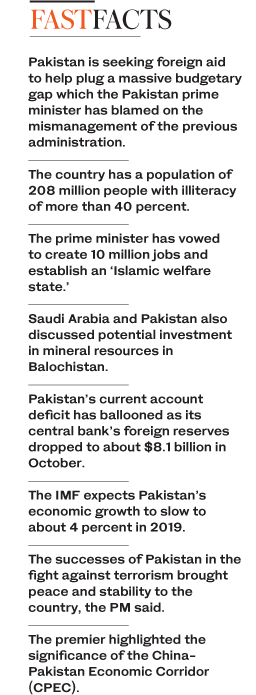RIYADH: Saudi Arabia has pledged $3 billion in support to Pakistan and allowed for deferred oil payments to help stave off a budget crisis.
The deal came as Pakistani Prime Minister Imran Khan attended the opening of the Future Investment Initiative (FII) in Riyadh on Tuesday.
Earlier Khan met with King Salman and Crown Prince Mohammed bin Salman to discuss bilateral issues. It was his second visit to the Kingdom in just over a month.
“It was agreed Saudi Arabia will place a deposit of $3 billion for a period of one year as balance of payment support,” Pakistan’s Foreign Ministry said in a statement.
“It was also agreed that a one-year deferred payment facility for import of oil, up to $3 billion, will be provided by Saudi Arabia. This arrangement will be in place for three years, which will be reviewed thereafter.”
During his address to the gathering of global business executives, Khan also confirmed that Pakistan was in talks with the International Monetary Fund (IMF) for a new bailout.
Pakistan is seeking foreign aid to help plug a massive budgetary gap which the Pakistan prime minister has blamed on the mismanagement of the previous administration. During his election campaign, the former cricketer vowed to create 10 million jobs and establish an “Islamic welfare state.”
After a consultative visit last month, the IMF had warned that Pakistan needed to quickly secure “significant external financing” to avert a crisis.
Saudi Arabia and Pakistan have also discussed potential investment in mineral resources in Balochistan, the largest of Pakistan’s four provinces which borders Iran and Afghanistan.
Further discussions were held about a refinery project in Pakistan, the Finance Ministry said in the statement.
Pakistan’s external balance of payments represents one of the biggest challenges facing Khan.
 The country’s current account deficit has ballooned as its central bank’s foreign reserves dropped to about $8.1 billion in October.
The country’s current account deficit has ballooned as its central bank’s foreign reserves dropped to about $8.1 billion in October.
That was barely enough to meet the country’s sovereign borrowings between now and the end of the year.
The IMF expects Pakistan’s economic growth to slow to about 4 percent in 2019.
Pakistan is seeking to attract increased inward investment to help shore up its finances and Khan used the event as platform to talk about opportunities in sectors such as tourism, minerals, coal and gas exploration.
He also highlighted what he said were the successes of Pakistan in the fight against terrorism, which has brought peace and stability to the country, and pointed to the significance of the China-Pakistan Economic Corridor (CPEC).
China has become an increasingly high-profile investor in Pakistan as Beijing pushes ahead with major projects such as the CPEC.



























